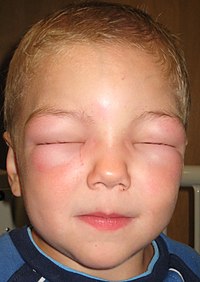
Photo from wikipedia
SUMMARY Hereditary angioedema (HAE) is a rare autosomal dominant disease with deficiency (type I) or dysfunction (type II) of C1 inhibitor, caused by mutations in the C1-INH gene, characterized by… Click to show full abstract
SUMMARY Hereditary angioedema (HAE) is a rare autosomal dominant disease with deficiency (type I) or dysfunction (type II) of C1 inhibitor, caused by mutations in the C1-INH gene, characterized by recurrent submucosal or subcutaneous edemas including skin swelling, abdominal pain and life-threatening episodes of upper airway obstruction. The aim of this study was to investigate healthcare experiences in children with HAE due to C1 inhibitor deficiency (C1-INH-HAE) in Croatia in order to estimate the number of affected children and to recommend management protocols for diagnosis, short-term prophylaxis and acute treatment. Patients were recruited during a 4-year period at five hospitals in Croatia. Complement testing was performed in patients with a positive family history. This pilot study revealed nine pediatric patients positive for C1-INH- HAE type I, aged 1-16 years, four of them asymptomatic. Before the age of one year, C1-INH levels may be lower than in adults; it is advisable to confirm C1-INH-HAE after the age of one year. Plasma-derived C1-INH is recommended as acute and short-term prophylactic treatment. Recombinant C1-INH and icatibant are licensed for the acute treatment of pediatric patients. In Croatia, HAE is still underdiagnosed in pediatric population.
Journal Title: Acta Clinica Croatica
Year Published: 2019
Link to full text (if available)
Share on Social Media: Sign Up to like & get
recommendations!